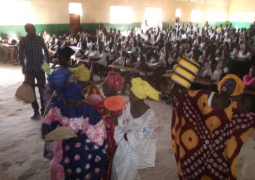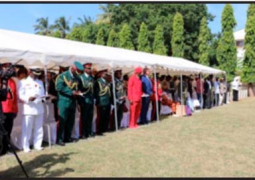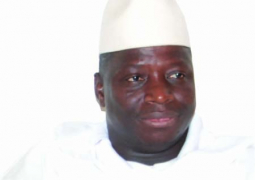Sovereignty does not reside in the person who is without power and voice to say who should govern a country
The opposition Peoples Democratic Organisation for Independence and Socialism has issued a statement on the current general voter registration exercise underscoring, among others, the importance of the voter’s card, and the need for Gambians of voting age to be registered ahead of scheduled elections.
The statement, signed by its Secretary General, Halifa Sallah, noted that as the registration exercise commences, Gambians are beginning to witness the “crisis which has gripped our system of determining citizenship.”
Below we reproduce the statement verbatim:
“The long-awaited registration exercise has begun in earnest. The old voters’ cards are now invalid. If one does not get a new voter’s card one will not be able to vote in the next presidential and National Assembly elections or in any referendum held in 2011 and 2012.
“The voter´s card is what enables each Gambian to be equal to the other in power, and voice to say who will manage the affairs of the country on one´s behalf. It is, therefore, important that every Gambian who has attained the age of 18 years or would attain the age of 18 years by 24th November 2011, goes to the nearest registration centre in one’s constituency or one´s place of birth, to be registered as a voter.
“As the registration of voter’s commences, Gambians are beginning to witness the crisis which has gripped our system of determining citizenship.
“Last week all Gambians who are exposed to the print media may have read the case of the elders resident at Kotu Quarry whose ID Cards were seized, despite the fact that they have lived in The Gambia for decades and have been allowed in the past to possess voter’s cards. Their children who were born in The Gambia also could not hide their frustration and shock for having been rendered stateless by depriving their parents of Gambian citizenship.
“Fourty-six (46) years have elapsed since The Gambia gained the right to self determination. “However, no effort has been made to examine the laws on citizenship with a view to make them responsive to the demographic composition of the country.
“In the 1980s, we made it abundantly clear that there are people who have lived in this country for decades, but have not been told that they could naturalise and become Gambian citizens, after a seven year stay.
“We told such people that they were being cheated by political interest groups, whose members assist them to get national documents and voter’s cards, instead of assisting them to naturalise to become Gambian citizens and get their national documents without any fear of being victimized in the future.
“We warned that those who failed to naturalise are turning their own children into stateless persons in The Gambia, because the law on citizenship indicated that one could only be a citizen by birth, if one was born before 1965, if one’s parent or grandparent was born in The Gambia or had naturalized to be a citizen of The Gambia.
“Our wise counsel was largely ignored. We further indicated that according to the 1965 constitution those born in The Gambia before 1965 of parents who were not born in The Gambia were given the opportunity to be registered as citizen of The Gambia before 1967, but that the literate people of the day hardly knew what was in the constitution or did not have the interest to conduct civic education to inform the people.
“Hence 1967 elapsed without the people concerned knowing their rights. We spared no effort in telling the people that all those women who were married to Gambian men could have been registered to become citizens by marriage. This has also been largely ignored by those who should have benefited.
“We made it our duty to explain that the 1970 constitution has made it a requirement that a person born in The Gambia after 1965 could only be a citizen of The Gambia, if one of his or her parents is a citizen of The Gambia.
“We cautioned that under such a provision a person could be born in The Gambia of parents who were not born in The Gambia, and have a child who is born in The Gambia who would not be considered a citizen of the country. A ridiculous and ambiguous constitutional provisional, indeed, isn’t it?
“During the review of the Constitution in 1996, we pointed out the shortcomings of the 1970 constitution on citizenship, and called for reform.
“We called for all those who would have been citizens by naturalization in 1996, but did not apply because of ignorance of the procedures to be mentioned in a provision which accords citizenship through registration.
“We also recommended a complete separation between citizenship by birth and citizenship by descent, so that everyone born in The Gambia would be qualified to be a citizen by birth, and all those who are born abroad of a parent who is a Gambian citizen would qualify to be a citizen by descent.
“The 1997 constitution did not alter the provisions on citizenship in the 1997 constitution for the better. On the contrary, it made them to be more stringent.
“While a person had to stay in The Gambia for seven years and be qualified to apply for naturalization, now one has to stay in The Gambia for 15 years to be qualified.
“Secondly, women married to Gambian citizens before 1997 could apply to be registered as citizens without any time stipulated regarding length of residence. Now, both male and female persons have to stay in the country for seven years before one could be qualified to apply for citizenship by marriage.
“The APRC executive and members of the National Assembly had done nothing to address the crisis of citizenship nor have they put in place proper procedures to register and provide documents for births and deaths that are durable.
“This is why attestations are relied on by tens of thousands of people to get voter’s cards.
“If we ever take charge of the country, on our own or through a coalition, we would put on the national agenda the policy of registering all those who would have been citizens of the country by birth, naturalization, marriage and descent if they were aware of what to do.
“All of them would get national identity cards. We would also ensure that all those who are already qualified to be Gambian citizens are granted national identity cards.
“This would give us a good starting point in knowing who are the citizens of the country. This would be followed by appointing scribes for all village headmen or headwomen to record all birth and deaths, which must be forwarded on a quarterly basis, to the central statistics department which shall have a branch in each region.
“All babies shall be issued with a birth certificate which shall take the form of a national identity card. This card would be retained until one reaches 18 years and would be automatically utilised to get a national ID card. This same national ID card would be utilised to get a voter’s card. Under such a system, there will be no need for attestation forms or disputes on citizenship.
“There will be no stateless persons. Hence all those stateless persons who are struggling underground to get voter’s cards should blame the APRC for excluding them.
“They should form an association instead to demand for inclusion through constitutional and legal reforms on citizenship, and the provision of viable procedures on citizenship by naturalization and marriage that are known to all and could be easily utilised to achieve one’s aim.
“They are assured of such reforms, if we are ever in charge or could influence executive policy.
Furthermore, we have been following the registration exercise in Banjul, the Kanifing Municipality and the West Coast Region”.




